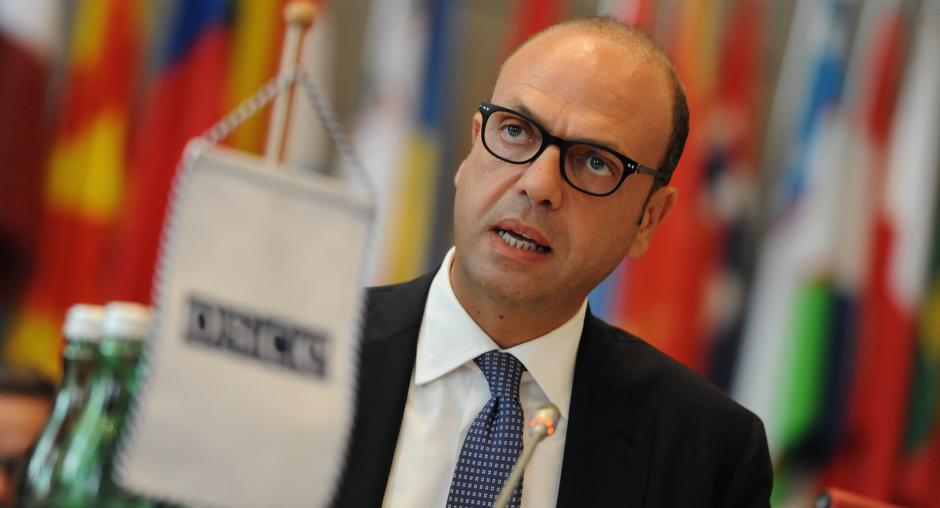Italy’s 2018 OSCE Chairmanship will work to recapture the ‘authentic spirit of Helsinki’, says Italian Foreign Minister Angelino Alfano

VIENNA, 20 July 2017 – Recognizing that shared challenges require common solutions, Italy’s Chairmanship of the OSCE in 2018 will work to capture the ‘authentic spirit of Helsinki’ and encourage a sense of responsibility and solidarity on the part of each of the OSCE’s 57 participating States to address the multitude of security threats facing the region, Italy’s Foreign Minister Angelino Alfano said today as he addressed the OSCE Permanent Council in Vienna on the upcoming Chairmanship’s priorities.
Recalling the Helsinki Final Act of 1975, Alfano said that “seeking the ‘spirit of Helsinki’ is not to return to the past, but to rediscover the spirit that secured dialogue even in the toughest years of the nuclear threat.”
He said Italy’s Chairmanship would “build on those foundations a ‘Helsinki of the 21st century’, which tears downs the ‘wall against the wall’ attitude that too often opposes us one against the other, and against the interests of all. “Consensus is not a weakness but a strength. Italy will continue working in the positive spirit of previous OSCE Chairmanships, and together with current and future Troika partners Germany, Austria and Slovakia, continuously pursue dialogue and co-operation as a way of addressing common challenges.”
“The crisis in and around Ukraine has called into question the principles on which the OSCE is based; on the other hand, however, it has clarified - once and for all - how much the world needs the OSCE to resolve the crisis,” said the Foreign Minister.
Alfano said Italy would continue supporting all OSCE efforts towards a peaceful resolution of the conflict and urged the implementation of the Minsk agreements, in full respect for the sovereignty, territorial integrity, unity and independence of Ukraine.
Italy, he said, would also continue strengthening the OSCE’s work in addressing the other protracted conflicts in its region through the existing formats: the Geneva International Discussions on dealing with the consequences of the 2008 conflict in Georgia; the 5+2 Transdniestrian settlement talks; and the work of the Minsk Group and the efforts of its three Co-Chairs on resolving the Nagorno-Karabakh conflict.
The Italian Chairmanship intends to promote stronger attention within the OSCE to the challenges coming from the Mediterranean region, said Alfano. “The Mediterranean security dimension is complementary, and not an alternative, to the OSCE's Euro-Asian dimension,” he stressed.
As well as terrorism, he identified the migration crisis as a priority of the Italian Chairmanship. “We intend to address this challenge not only from a security point of view but also through the fight against intolerance and discrimination, promoting pluralism, inclusion and inter-cultural and inter-religious dialogue, which are the foundations of peace and security.”
Turning to the politico-military dimension, the Italian Foreign Minister said his country would work to restore trust and build confidence in the field of arms control, to update the tools at our disposal given the pace of technological evolution. The ongoing "Structured Dialogue" on current and future challenges to European security is also an instrument Italy would seek to prolong.
Establishing concrete forms of co-operation in cyber/ICT security, increasing efforts to make young people less vulnerable to violent extremism and radicalization that leads to terrorism and combating the illicit trafficking of drugs and cultural goods were also identified as priority areas.
The OSCE’s economic and environmental dimension remains the most fertile ground for constructive interaction between participating States, while in the human dimension, the Italian Chairmanship will work to support the link between the protection of fundamental rights and the pursuit of peace, security and prosperity.
Alfano noted that the Italian Chairmanship would pursue a cross-cutting approach in several areas, such as trafficking in human beings, by combating trafficking networks, supporting the protection of victims and strengthening co-operation with the Mediterranean and Asian Partners for Co-operation.
“A distinctive feature of our Chairmanship will be dialogue and inclusion, enhancing the role of the OSCE's autonomous institutions as well as engagement with civil society, think tanks and universities,” said Alfano.
Concluding his address, he encouraged the OSCE’s participating States to show political will in addressing these security challenges: “This is an organization that has always produced concrete results when all its participating States have collaborated constructively and with a genuine spirit of shared responsibility.”
The newly appointed Secretary General of the OSCE Thomas Greminger, as well as Ingibjörg Sólrún Gísladóttir, Director of the OSCE Office for Democratic Institutions and Human Rights, OSCE High Commissioner on National Minorities Lamberto Zannier and Harlem Désir, OSCE Representative on Freedom of the Media, took part in the Permanent Council for the first time.
